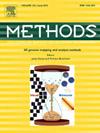Deep learning based method for predicting DNA N6-methyladenosine sites
IF 4.2
3区 生物学
Q1 BIOCHEMICAL RESEARCH METHODS
引用次数: 0
Abstract
DNA N6 methyladenine (6mA) plays an important role in many biological processes, and accurately identifying its sites helps one to understand its biological effects more comprehensively. Previous traditional experimental methods are very labor-intensive and traditional machine learning methods also seem to be somewhat insufficient as the database of 6mA methylation groups becomes progressively larger, so we propose a deep learning-based method called multi-scale convolutional model based on global response normalization (CG6mA) to solve the prediction problem of 6mA site. This method is tested with other methods on three different kinds of benchmark datasets, and the results show that our model can get more excellent prediction results.
基于深度学习的 DNA N6-甲基腺苷位点预测方法。
DNA N6甲基腺嘌呤(6 mA)在许多生物学过程中发挥着重要作用,准确识别其位点有助于人们更全面地了解其生物学效应。以往的传统实验方法非常耗费人力,而随着 6 mA 甲基化基团数据库的逐渐庞大,传统的机器学习方法也显得有些力不从心,因此我们提出了一种基于深度学习的方法--基于全局响应归一化的多尺度卷积模型(CG6mA)来解决 6 mA 位点的预测问题。我们在三种不同的基准数据集上对该方法与其他方法进行了测试,结果表明我们的模型可以获得更出色的预测结果。
本文章由计算机程序翻译,如有差异,请以英文原文为准。
求助全文
约1分钟内获得全文
求助全文
来源期刊

Methods
生物-生化研究方法
CiteScore
9.80
自引率
2.10%
发文量
222
审稿时长
11.3 weeks
期刊介绍:
Methods focuses on rapidly developing techniques in the experimental biological and medical sciences.
Each topical issue, organized by a guest editor who is an expert in the area covered, consists solely of invited quality articles by specialist authors, many of them reviews. Issues are devoted to specific technical approaches with emphasis on clear detailed descriptions of protocols that allow them to be reproduced easily. The background information provided enables researchers to understand the principles underlying the methods; other helpful sections include comparisons of alternative methods giving the advantages and disadvantages of particular methods, guidance on avoiding potential pitfalls, and suggestions for troubleshooting.
 求助内容:
求助内容: 应助结果提醒方式:
应助结果提醒方式:


